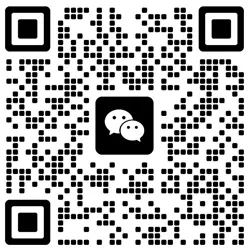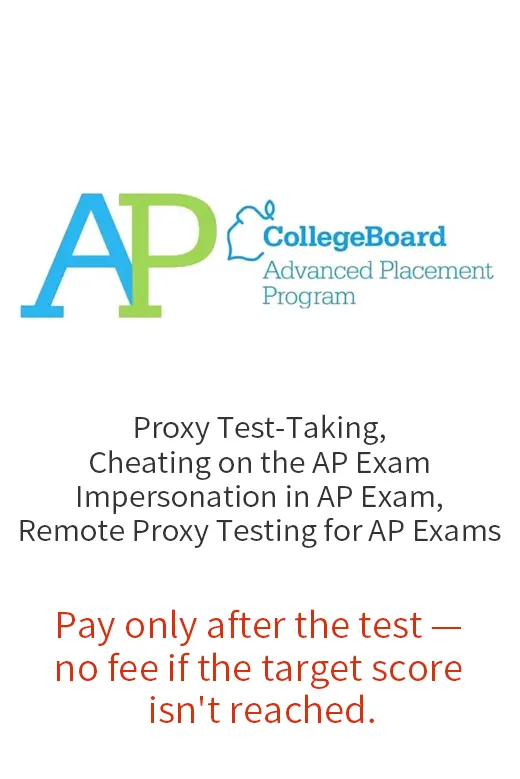
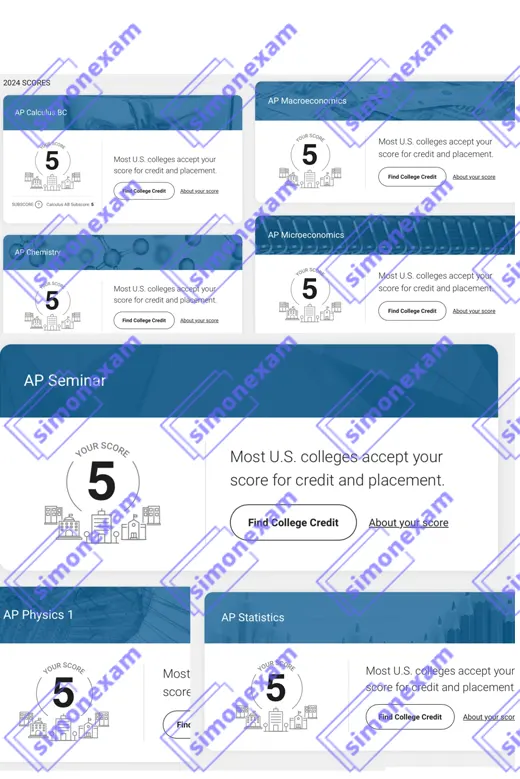
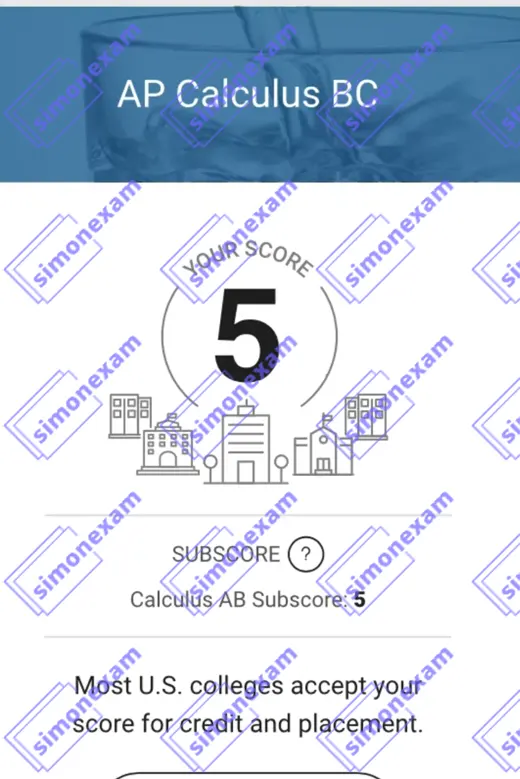
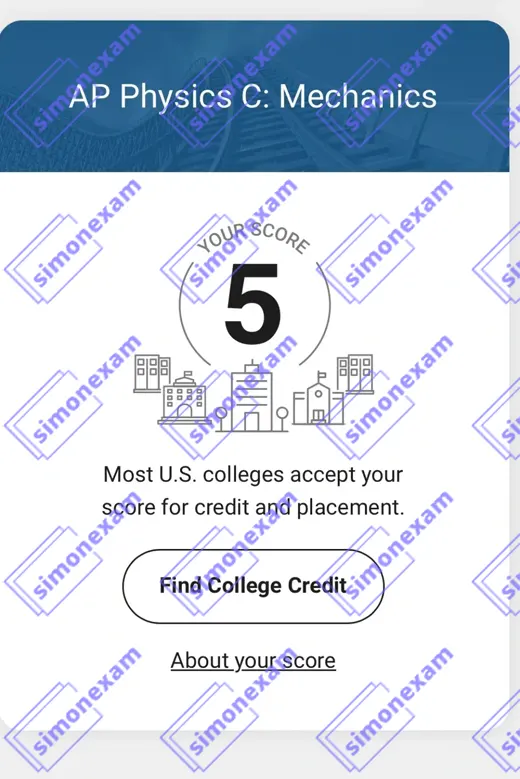
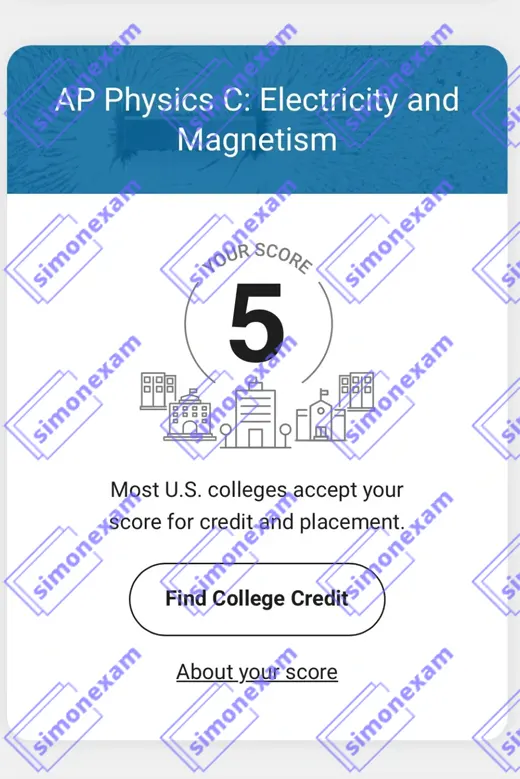
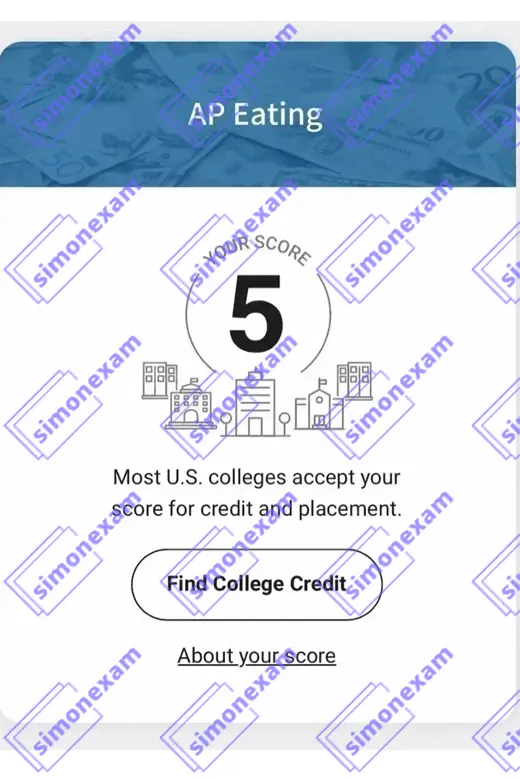
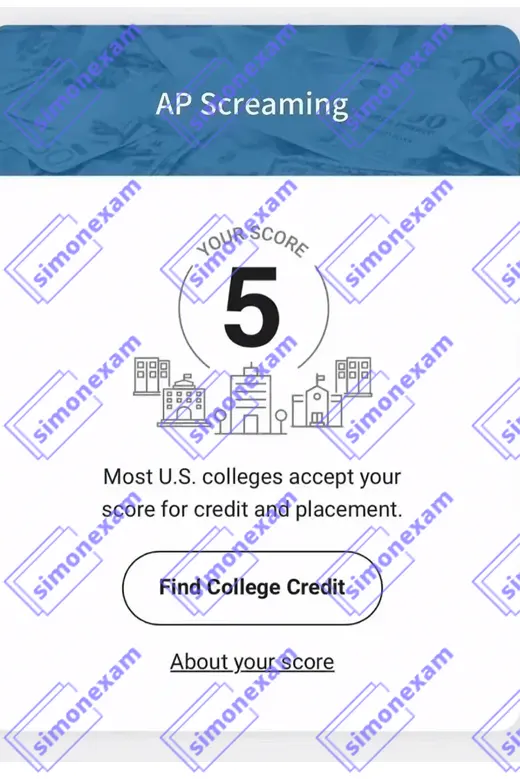
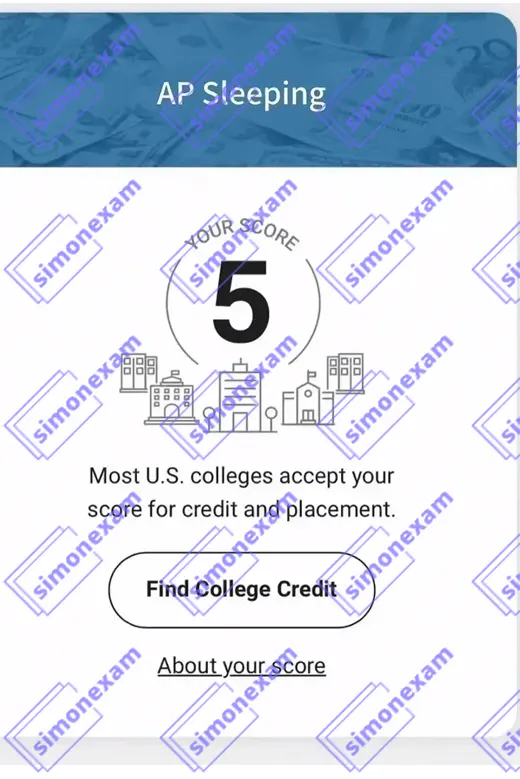
What is the AP Exam?
The AP (Advanced Placement) Exam is a globally recognized college-level examination program administered by the College Board. It is highly valued by universities in the United States, Canada, and many other countries. Earning a strong AP score allows students to demonstrate academic excellence, stand out in college applications, and even earn university credits or course exemptions.
AP exams cover a wide range of subjects, including Math, Physics, Chemistry, Biology, Computer Science, Economics, Psychology, History, Languages, and more—over 30 subjects in total. The exams are scored on a standardized 5-point scale, and many top universities accept scores of 4 or 5 for credit or advanced placement. However, due to their advanced content, fast pace, and academic rigor, AP exams are considered challenging, especially for students with limited time or less academic support.
That’s where SimonExam becomes your best choice! We professionally offer AP exam assistance, AP prep tutoring, guaranteed score support, remote AP test help, high-score strategies, and full-subject mock testing services—all-in-one solutions designed to help you pass with ease and achieve top scores, fast-tracking your path to elite universities!
Why choose SimonExam?
Take the test first, pay later.
💎 Great Value for Money
Our prices may not be the lowest, but we offer the best value. With industry-leading technology and a professional team, we ensure safety and reliability.
🛡️ Taobao Transactions Available, Zero Risk
We support transactions through Taobao — take the test first, then payment. Transparent and secure, giving you peace of mind. Detailed transaction process available.
✅ No Fees If Target Score Is Not Achieved
We promise no fees if you don’t reach your target score! Truly zero risk, so you can confidently aim for your goal.
🎁 Long-Term Cooperation Discounts
Enjoy exclusive discounts and rebates for long-term cooperation or referrals as a token of appreciation for our trusted customers!
Authorized Top-tier SAT Test Taker
✅ Professional Test Takers from Top 50 QS Universities
All test takers hold master’s or doctoral degrees from the world’s leading universities. They undergo strict vetting and systematic training, possessing excellent AP knowledge, practical test experience, and precise exam strategies.
💯 100% Professional Competence Guaranteed
Our test takers are carefully selected and rigorously tested. They are familiar with AP content and key points, expertly handling various exam scenarios to ensure high scores.
🔍 Precise Matching for Guaranteed Success
We match you with the most suitable test taker based on your target AP score, ensuring your exam performance meets your goals and making achieving high scores easier!
Equipment Requirements for AP Proxy Test Taking
- Prepare a Windows computer with Windows 10 operating system, with at least 8GB of RAM (Macs running Windows are not supported).
Note: Do not use public computers, such as those in institutions, as most have remote monitoring software installed. The organization is not responsible if your exam is flagged or you are denied entry due to using a public computer. - Please ensure the computer’s built-in webcam, microphone, and speakers are all functioning properly.
For desktop computers, you need to purchase an external all-in-one device with a webcam, microphone, and speakers. Headphones are not allowed. These devices are essential to ensure students can safely pass the exam software’s system checks. - Before the exam, make sure to uninstall any online banking plugins, antivirus software, large games, and any software with high security levels or online voice communication features (it’s best to reinstall the system).
- Disable the computer firewall and VPN/proxy.
Set the computer screen resolution to 1280×768 (this resolution is optimal and helps reduce network speed issues, ensuring stable performance for the proctor).
The faster, the better. Download speed should be no less than 100 Mbps, and upload speed no less than 20 Mbps.
Speed test websites:
- speedtest.cn(for China)
- speedtest.com(for international use)
Install “Sunflower” (Xiangrikui) or “Todesk”.
This is to allow our technical staff to check whether your computer meets the exam requirements and to install our internal software. You can uninstall the internal software once installation is complete.
- All pre-exam information verification is completed by the student themselves.
- The proctor only takes over answering once the exam questions appear on the screen.
- While the proctor is answering, the student must keep their hands on the mouse and keyboard, appearing to be actively engaged. They should not be idle, shaking their head, or behaving in a way that might raise suspicion from the monitoring proctor.
- Some exams may require a whiteboard or scratch paper, so please prepare these in advance.
AP Exam Content & Structure Analysis
AP Exam Overview & Structure Explained
The AP (Advanced Placement) exam, developed by the College Board, is an internationally recognized college-level examination program. Designed for high school students, AP exams test your readiness for university-level courses and can help you earn college credit before graduation.
📚 AP Course Categories & Subjects
AP exams cover a wide range of academic disciplines, giving students the opportunity to showcase their strengths in specific subject areas.
| Subject Category | Subject Name (English) |
|---|---|
| Math & Science | AP Calculus AB/BC, AP Statistics, AP Biology, AP Chemistry, AP Physics, AP Environmental Science |
| English & Literature | AP English Language, AP English Literature |
| History & Social Sciences | AP U.S. History, AP World History, AP Psychology, AP Government, AP Economics |
| Languages | AP Chinese, AP French, AP Spanish, AP Japanese |
| Arts & Computer Science | AP Music Theory, AP Art & Design, AP Computer Science A, AP Computer Science Principles |
🔍 Key Features of the AP Exam
📌 College-Level Rigor: AP exams evaluate students’ ability to handle college-level material across different subjects.
📌 Global Recognition: AP scores are accepted by thousands of colleges and universities worldwide for credit or placement.
📌 Score Scale: AP exams are graded on a 1–5 scale, with many colleges awarding credit for scores of 4 or 5.
📌 Flexible Subject Choice: Students may choose to take one or several AP subjects depending on their academic goals and university applications.
📅 AP Exam Timing & Format
AP exams are offered once a year in May, with registration typically beginning in the fall. All exams are standardized and proctored either in schools or official testing centers.
- Exam Format: Most exams include multiple-choice and free-response questions.
- Duration: 2 to 3 hours per subject.
- Delivery: Administered on paper or digitally, depending on subject and school.
📝 AP Exam Eligibility
The AP exam is open to all high school students worldwide. There are no strict prerequisites, but familiarity with the subject is recommended.
✅ Ideal Candidates:
- High school students aiming to apply to competitive universities.
- International students looking to boost U.S. or Canadian college applications.
- Students who want to earn college credit early and save on tuition.
💰 AP Exam Costs
The cost of AP exams can vary slightly by country or school, but typical fees include:
- Registration Fee: Charged per subject (approx. $95–$140 USD depending on location).
- Late Registration or Cancellation Fees: May apply if changes are made after the deadline.
- Rescheduling or Re-testing Fees: Extra charges may apply for missed or repeated exams.
📌 AP Remote Testing: Rules & Reminders
For students taking AP exams online (where available), it’s important to follow strict proctoring protocols:
❌ No Physical Notes or Books Allowed
All external reference materials are prohibited unless specified for open-note sections.
📵 No Use of Unauthorized Devices
Mobile phones, smartwatches, and secondary screens are strictly forbidden during testing.
📄 Scratch Paper Use
Allowed only with approval. Students must show and destroy all paper as instructed by proctors.
⏳ No Early Score Access
Students must wait for official College Board score release—unauthorized access or attempts may result in penalties.
🚻 Bathroom Break Rules
Short breaks are allowed under supervision. Students must inform the remote proctor before leaving.
🎯 How to Choose a Reliable AP Exam Support Service?
For students aiming for top-tier colleges, AP exam scores can be crucial. However, due to the difficulty and academic level of these exams, many students seek expert assistance to prepare and perform well. Here’s how to choose the right AP prep or support service:
✅ Understand Your Own Needs
Not all students struggle with the same subjects. Choose a service that offers targeted support—whether full-subject tutoring, essay help, or mock test simulations.
🔍 Use Trusted Recommendation Channels
Look for AP support providers via:
- Official websites & social media
- Student forums & Reddit communities
- Recommendations from classmates or counselors
🎓 Vet Your AP Tutors or Experts
Your tutor’s skill level directly affects your score. Check for:
- Subject-matter expertise (e.g., AP Calc, AP Lit, etc.)
- Previous success helping students score 4s and 5s
- Offers of diagnostic tests or sample sessions
🛡 Ensure Security in Remote Support
If you’re seeking virtual help, make sure your service provider:
- Uses encrypted platforms and secure communication
- Respects student privacy and academic integrity
- Understands College Board rules and avoids risky practices
Recommended Reading
线上考试作弊有哪些?一文讲清楚,掌握这些技巧轻松应对
在数字化时代,线上考试已成为主流,许多人面对复杂的考试环境时,会寻求一些辅助手段来提升表现。本文将全面剖析线上…
网考代考被骗案例,你中招了吗?紧急避坑指南
在当今数字化时代,在线考试已成为许多学生和职场人士的常态。网考代考服务应运而生,帮助无数人应对繁重的学业压力。…
代考被抓后会被判刑吗?会给自己以后生活造成什么影响?
在当今快节奏的在线教育环境中,许多学生面临着各种考试压力,尤其是那些使用Safe Exam Browser(S…
找代写代写被骗怎么办?找代写代写被敲诈勒索怎么办?
在当今快节奏的学习环境中,许多学生面临着繁重的学术压力,选择寻求外部帮助来应对复杂的在线考试已成为一种常见的现…
代考被抓怎么办?选择这些解决渠道才是正解助你稳住局面
在在线考试越来越普及的时代,各种突发情况时有发生,尤其是当考试过程中出现意外时,如何快速应对成为许多人关注的焦…
怎么简单识别代考的骗子套路?一文教你避坑指南
在当今在线教育迅猛发展的时代,越来越多的考试通过网络平台进行,这为许多人带来了便利,但也衍生出了一些服务需求。…
代考被骗后如何最大化自己的权益?一步步教你扳回一城
在当今在线教育和考试日益普及的时代,许多学生面对繁重的学业压力,选择寻求外部帮助来应对各种在线考试。然而,当这…
AP Online Exam Cheating Service with Guarantee—What You Must Know in 2026
In the highly competitive landscape of college admissio…
Safe AP Exam Cheating Methods in 2026?Here’s What You Should Know Before Taking the Risk
As the 2026 AP exam season approaches, some students ar…
How to Cheat on AP Exam Without Getting Caught?Here’s the Truth and a Smarter Solution
Thousands of students Google how to cheat on AP exam wi…

